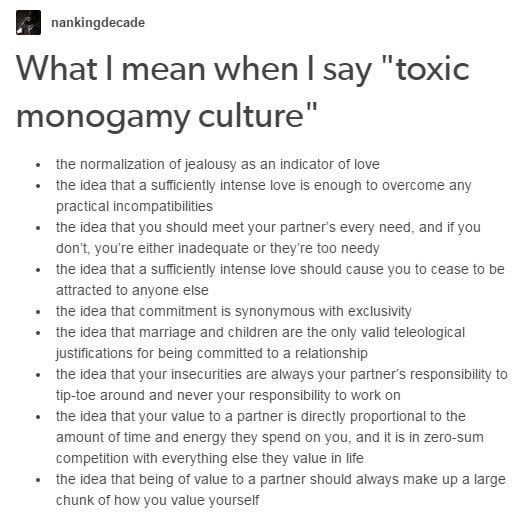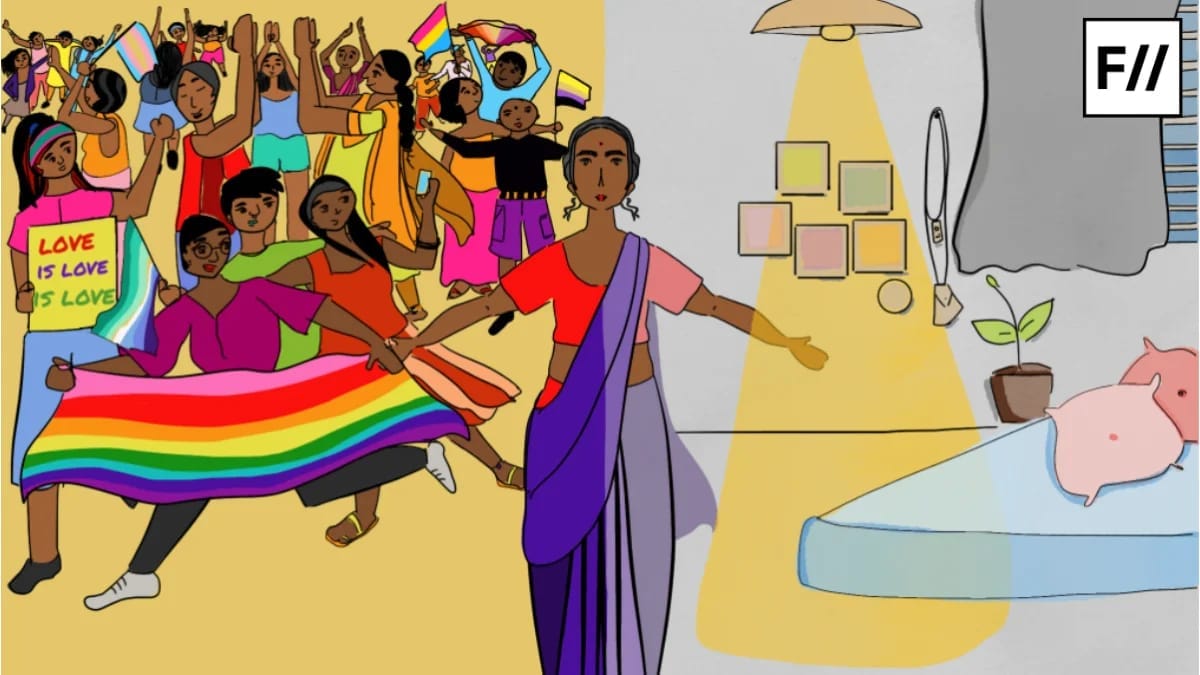Toxic monogamy culture – as defined by the idea of the prevalent love that is monogamous in nature – is a relatively new concept that has percolated throughout society, and can be seen in elements of relationships within the community. Toxic monogamy displays signs of codependency which manifests in ways that have invariably toxic outcomes. However, it’s very hard to identify as it is romanticised and sent out as a narrative of “true limitless love” instead of being seen as the problematic behaviour that it is. It even goes on to solidify gender roles within the relationship; further concretising that socially acceptable relationships are heteronormative in nature and therefore further marginalising relationships that are anything but heteronormative.

Source: Tumblr.com
We must look at this phenomenon on two levels – the way it manifests within monogamous relationships, and the way that manifestation also furthers a gender divide within said monogamous relationships – which makes this as a whole a toxic form of love and also one that creates divides. Here, we look at some of the components of toxic monogamy to understand it better and realise where it seeps into our relationships:
The acceptance of jealousy as an indicator of love
Jealousy is seen as a “right” or even something that’s desirable within a relationship. Calling it as such normalises and create an acceptance of jealousy and the negative emotions attached to it like insecurity and doubt. This normalisation only constructs a bubble where instead of confronting one’s problematic behaviour, one can justify it with “love”. Rather, an understanding of mutual trust and an erasure of the need to be jealous is what a healthy relationship should strive for.
The idea that you should meet your partner’s every need, and if you don’t, you’re either inadequate, or they’re too needy.
This echoes the idea that a relationship is meant to be a crucial puzzle piece that completes you, or that without it, you are incomplete; therefore it creates this pressure of a relationship matching up to being the ultimate satisfaction or tool that leads to complete satisfaction in all areas of one’s life. This then leads to one having such high expectations from a partner, which when not met might make you feel like they’re not the right person or that they are inadequate or wrong for you. This toxic cycle ends up creating expectations so unrealistic that you or your partner are unable to match up to, and these unrealistic expectations then breed toxic emotions that range from disappointment to sadness and self doubt.
The idea that being of value to your partner should always make up a large chunk of how you value yourself.
This thought process is largely conditioned in us, through society and a systemic ideal, and it creates a vicious co dependence where you start equating and hence merging your individual identity with that of your partners’. We are expected to be in a monogamous relationship and to take responsibility for how our partner feels at all times. One ends up sacrificing way too much of himself or herself in the process of trying to take onus of making the significant other happy. It takes away the onus from the individual to try and improve their quality of life and it puts unrealistic amounts of pressure on the partner to not only manage their own lives but also take accountability for the other persons’. A sense of individual accountability towards one’s thoughts and emotions is a realistic way of managing a relationship, and to come out of the unrealistic thought that we have been conditioned into, which ultimately sets us up for being disappointed on some level with ourselves and our partners
The idea that commitment is synonymous with exclusivity.
This when observed closely, seeks to disregard all other formats of relationships as invalid and devoid of love, and establish only monogamy as one that has love and therefore a bond strong enough to have commitment and exclusivity. This creates a perception of solidifying monogamy as the pallbearer of strong ideals associated with love, even though there are just as valid formats of relationships which have commitment and love. These formats are in turn now looked down upon and pushed to the fringes as ‘different’ because they haven’t been conditioned as normal or okay in society, in contrast to monogamy.
The idea that marriage and children are the only valid teleological justifications for being committed to a relationship.
Not only does it concretise the societal construct of marriage, but it also says that after a point love isn’t enough and it needs other additives such as children and marriage to be acceptable. This is where a clear idea of heteronormativity creeps in. For a lot of relationships, exclusively those that are in the community, many across the world aren’t even allowed to be legally recognised as a gender or orientation, let alone be able to dream of marriage or legally having children. So when people of the community are conditioned into such toxic ideals they see their love as less or inadequate and therefore as something that they may not perceive to be right. Further, a lot of relationships consist of people who may not want to get married or have children; they are also now exposed into a system that by virtue of its toxic beliefs, sees their love as one that may not have commitment, or be real.
Also Read: The Anger and Angst in (Failed) Queer Relationships
Featured image source: Medium
About the author(s)
Damini Mehta is a second year philosophy student who likes having basic human rights and conversations about dismantling patriarchy





Wtf
I am a little confused by this article – is it monogamy that is ruining our relationships or jealousy? And would polyamory mean an absence of all these features? The writer needs to reframe the argument. There are plenty of advantages to being monogamous though by no means does it mean that other relationship choices should be stigmatised. Heternormativity and patriarchy is the problem, not monogamy!
What does this article mean ? I don’t agree . Monogamy and marriage to the one and only the one we love is wrong?
Original post by nankingdecade conceptualizing the ‘toxic monogamy culture’ as containing definitive components is subjective and without the backing of scientific research and studies. The ideas mentioned in the post does reflect some of the serious problems that couples face in a relationship or partners suffer as a result of and it can occur in any relationship, making such a relationship unhealthy (toxic) but surely these issues can be dealt with. Calling it a manifestation of some ‘toxic monogamy culture’ is erroneous and even dangerous, especially that the word ‘culture’ is present.
If government of India recognise monogamy, Polygamy, Polyandry and Free love as there was in ancient India, then your concern will get solve.
“Sufficiently intense live overcomes practical incompatibilities”
Can someone elaborate this point?
Marriage or Monogamous Relationships primary purpose is to give a safe and secure environment to our childrens who in their infancy cant even wipe their backs and will die without parents support , Institution of Marriage is to give our children emotional financial and affectionate support system so they can become a Civilised Individuals , If we remove the this purpose from relationships then our relationships will always find a path of escapism which will eventually harm our children , Stats are out there how Single parent children struggle and remain destablised through out their life
Life must be shit, when everything thing seems toxic and offensive.
I agree with the post wholeheartedly. But I believe a bullet point is missing: monogamy is not love.
Meaning that monogamy or fidelity (to the idea of monogamy as an end in itself) does not prove anything in the sense of empathy or concern of the other person. It proves you can win the rules of a game (you set up for and play against yourself). It is abundantly possible to be absolutely faithful AND absolutely hateful to your partner.